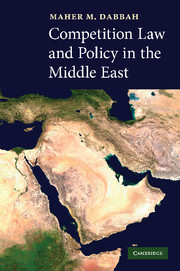Book contents
- Frontmatter
- Contents
- Preface
- List of abbreviations
- 1 Introduction
- 2 The relationship between Islam and competition law and policy
- 3 Israel: the region's oldest competition law
- 4 Turkey: a European dream from the other side of the border
- 5 The Arab Maghreb countries
- 6 Jordan's 2004 Competition Law
- 7 The Gulf States: a possible model for regional cooperation
- 8 The Arab Republic of Egypt: the chase after globalisation
- 9 Lebanon and Syria: a tale of two states
- 10 Conclusions
- Index
7 - The Gulf States: a possible model for regional cooperation
Published online by Cambridge University Press: 20 July 2009
- Frontmatter
- Contents
- Preface
- List of abbreviations
- 1 Introduction
- 2 The relationship between Islam and competition law and policy
- 3 Israel: the region's oldest competition law
- 4 Turkey: a European dream from the other side of the border
- 5 The Arab Maghreb countries
- 6 Jordan's 2004 Competition Law
- 7 The Gulf States: a possible model for regional cooperation
- 8 The Arab Republic of Egypt: the chase after globalisation
- 9 Lebanon and Syria: a tale of two states
- 10 Conclusions
- Index
Summary
The six Arab states of the Arabian Gulf, namely Bahrain, Kuwait, Oman, Qatar, Saudi Arabia and the United Arab Emirates (UAE), are united by a number of factors. A notable factor among these – in addition to commonality of language and religion and the geographic proximity – is the possession of these countries of vast oil resources which has been a hugely important driving force behind economic development, modernisation of domestic economies and building and expanding infrastructure, and an important source of the vast private wealth of a few families and individuals. An open solidarity between these countries has always existed although many would argue this has been paralleled by quiet rivalry, though not necessarily in a positive economic sense. This solidarity found particular expression in the creation of the Cooperation Council for the Arab States of the Gulf (GCC) in 1981. The GCC is a community offering a form of regional cooperation between these countries and has a wide range of objectives stretching from coordination and integration in all fields to formulating similar regulations in various fields and introducing a single currency within the next four years. Interestingly, the objectives of the GCC appear to have some relevance to natural and legal persons of the Member States insofar as they provide for strengthening ties between their peoples, encouraging cooperation within the private sector and fostering scientific and technical progress.
- Type
- Chapter
- Information
- Competition Law and Policy in the Middle East , pp. 193 - 236Publisher: Cambridge University PressPrint publication year: 2007



